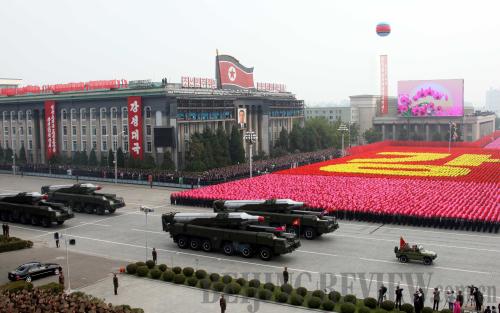|
 |
|
MILITARY STRENGTH: A grand military parade is held in Pyongyang on October 10 to celebrate the 65th anniversary of the founding of the WPK (YAO DAWEI) |
The Songun policy has since made great achievements. After two nuclear tests, the DPRK clearly has nuclear deterrence. And the world now has a new take on the DPRK's military strength, after a military parade celebrating the WPK's 65th anniversary on October 10. Many weaponry systems, like the Nodong, scud and surface-to-air missiles, were displayed during the parade. The country's new mid-range missile, Musudan, debuted in the parade, in front of media representatives from around the world—including from the United States—who were invited to the DPRK parade. The public appearance by Kim Jong Il's son was also eye-grabbing, but the weapons gained most of the world's attention. This parade showed the country's counter-invasion ability is much greater than in the 1990s.
The enhanced military strength creates opportunities to invest more resources into developing a lively economy. However, it is the decision of DPRK leaders whether or not to permit this transfer. The DPRK proposed 2012 as a target for becoming a strong country. The target is multifaceted: The country hopes to gain military strength and be unafraid of foreign threats, while creating a high standard of living. Its people would be able to live high-quality lives and would no longer be jealous of citizens of other countries. So after the country has reached certain military achievements, the leadership should make the rational choice of improving lives.
After the Korean War (1950-53), the DPRK's economy had solid growth. Before the ROK's economy took off, the DPRK's per-capita GDP was higher than that of the ROK's. Since the end of the Cold War, though, the DPRK's economy has been sliding. In the mid-1990s, the country's economy was even worse due to numerous natural disasters. In the 1980s, the country's annual grain production once reached 10 million tons. But in the mid-1990s, its annual grain production was about 3 million tons. The country's economy has generally recovered in recent years, but grain production is still limited. It had a good harvest in 2005, but still produced just 4.5 million tons. Reports said the DPRK predicted its grain production in 2010 to possibly exceed 5 million tons. But with a population of 23 million, the country needs 4 million tons just to feed its people. Counting other necessities, like grain seeds, fodder and industrial material, the DPRK needs at least 6 million tons of grain; this leaves the country with a grain shortage of 2 million tons. Living standards will hardly be improved if a steady grain supply cannot be guaranteed.
The country is actively developing agriculture and is importing a large amount of grain to meet needs. But there are only 1.85 million hectares of agricultural fields in the country. And due to serious soil erosion caused by natural disasters, most fields are barren. The largest problem for the country's agriculture, though, is a lack of industrial support.
Addressing sanctions
The DPRK has put too many resources into the military. The consequence has been insufficient agricultural infrastructure facilities, technologies, machinery and fertilizer, all of which are vital to agricultural development. To address the livelihood problem, the country must make economic development its national focus. However, whether or not such a transfer can be realized is closely connected with external environment changes and the DPRK's opinion on such changes.
It is true that Western economic blockades against the DPRK—stemming from the nuclear issue—have limited the country's economic development. Improving the external environment is a tough task for Pyongyang moving forward.
Before the WPK conference, some ROK media outlets guessed policies related to reform and opening up might be proposed. The guess was impractical, as the top problem for the DPRK is the external blockade. In fact, the DPRK began to entertain opening up near the end of the Cold War. For example, its government established the Rajin-Sonbong free trade zone in 1991. The program developed well in the mid-1990s, but stalled soon after. In the early 21st century, the country tried to reform its economic operations and develop comprehensive diplomacy, so as to develop relations with European countries and receive foreign investment.
In addition to domestic policy, international political elements also limited the country. When Kim Da Jung and Roh Moo Hyun were ROK presidents from 1998 to 2008, they implemented active policies with the DPRK, which helped improve the DPRK economy. But as DPRK-ROK political relations continued to deteriorate, their economic relationship froze. The sinking of the ROK warship Cheonan on March 26 dealt a further blow to the ROK-DPRK relationship.
In mid-October, the DPRK said it was willing to restart the six-party talks aimed at resolving the Korean Peninsula nuclear issue, hoping to break international limitations to its economic development. But when and how the talks reopen cannot be decided by a single party; the United States and the ROK play equally important roles in the negotiations. In the meantime, the DPRK must make a clear strategic choice on whether or not it will abandon its nuclear program. Nevertheless, the elimination of external limitations and the improvement of living standards will be great tests for the country's new leadership.
The author is an associate research fellow with the China Institute of International Studies
|
